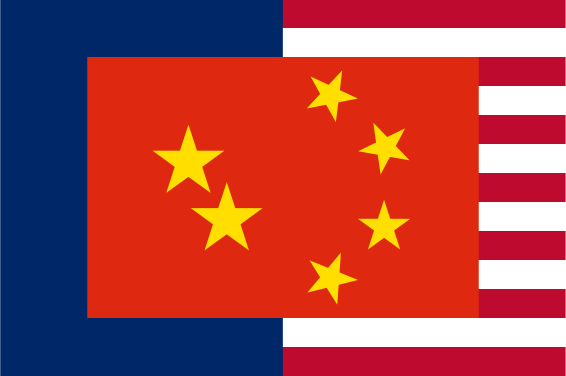Many people have never heard of Firefly. The TV show premiered in 2002, but was cancelled after 11 episodes (Fox set it up for failure by showing episodes out of order). Developed by Joss Whedon (Buffy the Vampire Slayer, Avengers), Firefly stars some familiar faces including Nathan Fillion (Castle, Dr. Horrible's Sing-Along Blog, Desperate Housewives), Morena Baccarin (Homeland, V), and Summer Glau (Dollhouse, Terminator: The Sarah Connor Chronicles). While the premise is familiar (a crew of renegades fight for survival on the outskirts of civilization), what makes Firefly truly a gem is its unique depiction of cultural change.
Firefly is a blend of American & Chinese culture
The Alliance flag is a literal combination of cultures.
Firefly takes place in a future where the U.S. and China have merged into one diverse superpower called the Alliance, resulting in a combined Chinese and American culture. Everyone is bilingual in Mandarin and English, but each is used in different situations. For example, people swear exclusively in Mandarin, which conveniently let Joss Whedon get away some very colorful metaphors including 笨天生的一堆肉 (stupid inbred stack of meat), 真沒耐性的佛祖 (extraordinarily impatient buddha), and 羔羊中的孤羊 (motherless goats of all motherless goats). The Alliance government, values, and beliefs borrow from both the U.S. and the People's Republic of China. Dress, food, and entertainment are influenced by Eastern and Western tastes. This fusion results in a nation that has traces of both America and China, yet remains unique. This is exactly how cultural change happens in real life.
Cultural change has many outcomes
Mal's "browncoat" is a symbolic rejection of Alliance culture.
Most people think assimilation (individuals accept a new culture, reject the old) is the only outcome of cultural change. But that's just one possibility in acculturation – the process of change that results when two or more cultures come into contact with each other. Acculturation can also result in in separation (original culture is completely maintained), marginalization (original culture is lost and there is no contact with the new culture), or integration (elements of both the original and new culture are maintained). Acculturation changes individuals entering a culture as well as that society’s culture. The development of jazz, everyday use of the Yiddish “klutz”, and the global popularity of pizza all occurred because individuals from different cultures influenced society through acculturation.
Circumstances often influence the course of one’s acculturation. Captain Malcolm "Mal" Reynolds fought (unsuccessfully) against the imperialism of the Alliance and was forced into its rule. He separated from many parts of Alliance culture (Mal refuses to dress like the Alliance, gets into fights with those celebrating Alliance holidays, and stays away from the geographical center of the Alliance), has integrated other aspects (he speaks both English and Mandarin and eats Alliance cuisine), and has become marginalized in one key area (after the Alliance took over his home, Mal lost faith in his religion). Mal shows us that acculturation doesn’t lead to uniformed change in a person. Instead, people change differently across many parts of culture depending upon their circumstances. Dr. Simon Tam, a man who grew up in the center of Alliance civilization, presents with a very different acculturative experience than Mal (one that is far more assimilated with the Alliance). Neither experience is right nor wrong, they’re just different.
Acculturation & Firefly helped me understand myself
Dr. Lau introduced me to acculturation and helped me understand the impact it had on my life.
Learning about acculturation as an undergrad had a big impact on me. As a child born and raised in California to immigrant parents, the experience of “culture clash” was a big part of my life. I dressed in jeans and t-shirts but my face didn’t look like most Americans. That juxtaposition didn't make me feel like I fit in. I remember being told to "go back where you come from" (the guy didn’t realize I was born in the neighboring suburb) while others criticized me for being too "white-washed" (which usually meant they wanted me to listen to more Tupac and less Nirvana). My psychology professor, Dr. Anna Lau, helped me realize that my identity wasn't exclusively one thing, but a mixture of many things. I spoke English and Urdu, adopted Western and Eastern values, craved kabobs and burgers. Pigeonholing me into just one category and judging me only on my appearance, as I did to myself and others did to me, ignored the richness of my experience.
Maybe that's why I love Firefly so much. The show can't be classified into one category. It's a combination of science fiction, western, and horror genres. Seeing a show that celebrates the diversity of acculturation and is itself a blend of multiple influences helped me feel a little less strange and a little more unique.
How has Firefly and/or acculturation influenced you? Sound off in the comments below. Haven't seen Firefly? Watch it instantly on Netflix, Amazon, or iTunes.




